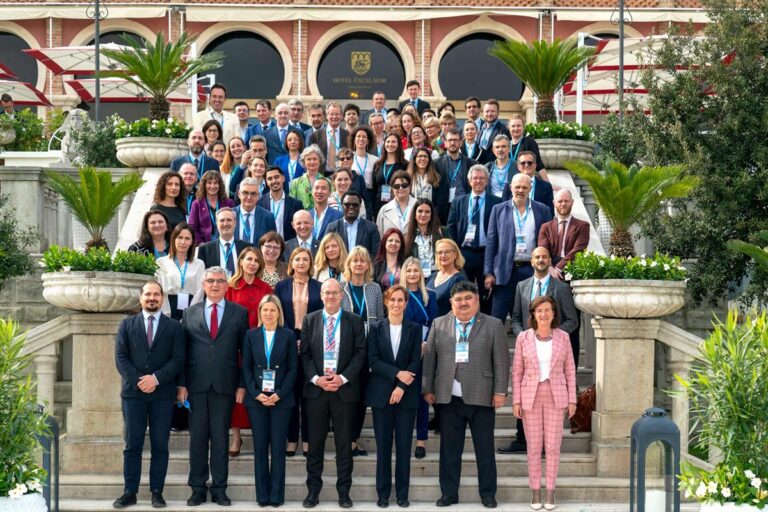At 105 years old, Sebastiano Maccioni attributes his long and happy life to the strong social connections he has always maintained within his community in Nuoro, Italy. His lifestyle is largely due to a healthy diet, an active life, and above all, keeping his mind engaged through a variety of activities, such as tending his vegetable patch or reading the newspaper. Sebastiano has always had access to basic necessities: a stable job, good food, safe housing, and clean air. His life embodies the essence of happiness and health equity that goes beyond monetary wealth.
Sebastiano shared the example of the ongoing work of the WHO European Office for Investment and Development (WHO Venice Office) with countries, regions and cities: For 20 years, the Venice Office has developed valuable evidence, indicators and policy guidance to support decision-makers and partners in implementing solutions to reduce inequalities and ensure people live healthier, thriving lives.
Celebrating 20 years of work for equity and wellbeing
“The best way to understand the value and impact of the Venice Office over the past 20 years is to imagine it never existed,” said Dr. Hans-Henri P. Kluge, WHO Regional Director for Europe, at the opening of an event celebrating the Office’s 20th anniversary in Venice, Italy, on April 9. “The Venice Office is truly one of WHO/Europe’s success stories. It is a driver and ally for policymakers working to reduce inequalities from the region to the world. It is a centre of excellence that brings together leaders and experts from different sectors around this common goal.”
“Reducing inequalities to achieve the goal of leaving no one behind is linked to the objectives of our organization,” said Giovanni Leonardi, Director General for One Health and International Relations at the Italian Ministry of Health. “Italy currently holds the Presidency of the G7, which has made lifelong prevention and healthy ageing one of its priorities.”
“Italy is not just a host country, it is a partnership in which we together shape the future of health and development,” said Dr Natasha Azzopardi Muscat, Director of Country Health Policies and Systems for WHO Europe. “Thanks to the work of WHO Venice, we are supporting the 12 smallest countries of the WHO European Region to address their specific health challenges and improve the well-being of their people. We are also strengthening the capacity of 41 regional authorities, enabling impactful health initiatives at the grassroots level. In addition, our Venice office has trained 2,000 health professionals to prevent and reduce gender-based violence within health systems and promote safer environments for all.”
Life lessons from a 100 year old
WHO Venice, in close collaboration with its host country, Italy, is leading the world in generating evidence and decision-making tools that countries can use to invest in health, equity and healthier societies, which are crucial for cohesive and safe communities and to enable people of all ages to live thriving lives with dignity.
When asked about the secret to aging, Sebastiano is clear: “I’m quite old, but I’m not old. I don’t feel old. And the best thing in my life is that I’ve always lived with my family,” he says. “The advice I would give to my grandchildren is to always find something to keep you busy.”
Investing in health throughout life should be seen as a progressive economic investment, stressed Manuela Lanzarin, Veneto’s Regional Secretary for Social Welfare: a healthy population leads to increased productivity, reduced healthcare costs and a reduced strain on the health system.
According to Simone Venturini, Venice’s city councillor for social cohesion, tourism and economic development, cities have a key role to play by ensuring that all sectors, not just health, are involved in the fight against inequality. If health and wellbeing are integrated into all policies, then a sustainable community model will be achieved.
“The Venice office focuses on innovative collaboration across countries and cities, working with health, economy, finance and social ministries,” explains Christine Brown, head of the Venice office. “Together we address pressing challenges such as social exclusion, ageing, loneliness and mental health, and urban-rural inequalities. It is critical that we invest in solutions that lead to healthier, more prosperous societies where all people can thrive.”
Investing in happiness
Steering societies in new directions amid growing political and social polarization and limited fiscal space is a challenge for the entire region. This challenge is particularly felt in Central Asia and the Western Balkans, where large numbers of working-age people are migrating, often leaving the most vulnerable behind.
In conjunction with the Venice Office’s celebrations, the second meeting of the WHO/Europe coordinated “Finding Common Ground” initiative took place, bringing together representatives from public health, the economy, the financial sector and central banks. This intersectoral dialogue builds on the recent WHO Europe Regional High-Level Forum “Health in a Well-Being Economy”, and the Pan-European Commission “Health and Sustainable Development”.
The initiative aims to create new modeling tools for central banks and finance ministries to shape fiscal and economic policies to enhance health equity and overall well-being, and also highlights the synergies between health and equity on fiscal stability and economic prosperity.
“The meeting allowed us to delve deeper into opportunities related to youth mental health, while also examining key aspects of healthy ageing,” explains Christine Brown, head of the Venice office. “By outlining a common model that spans health, finance, economics and central banking interests, we can strengthen much-needed cross-sectoral collaboration and enable countries to work towards developing collaboration models.”
Discussions at the Venice office’s 20th anniversary event will also feed into the International Well-Being Economy Forum taking place in Iceland in June, and Italy’s ambition to invest in a life course approach to healthy ageing as one of the priorities of its G7 Presidency.
The Venice office is also advancing policy and advocacy work through a side event at the UN General Assembly’s Future Forum in New York in September.


